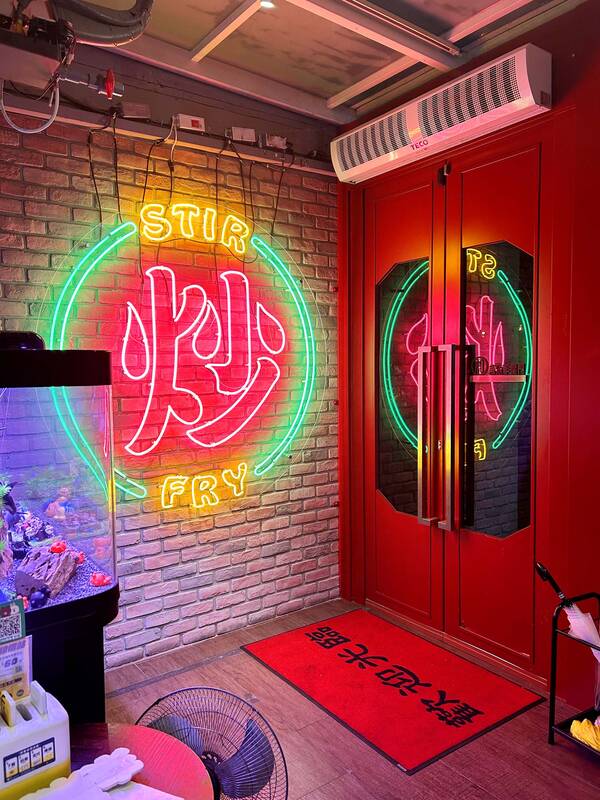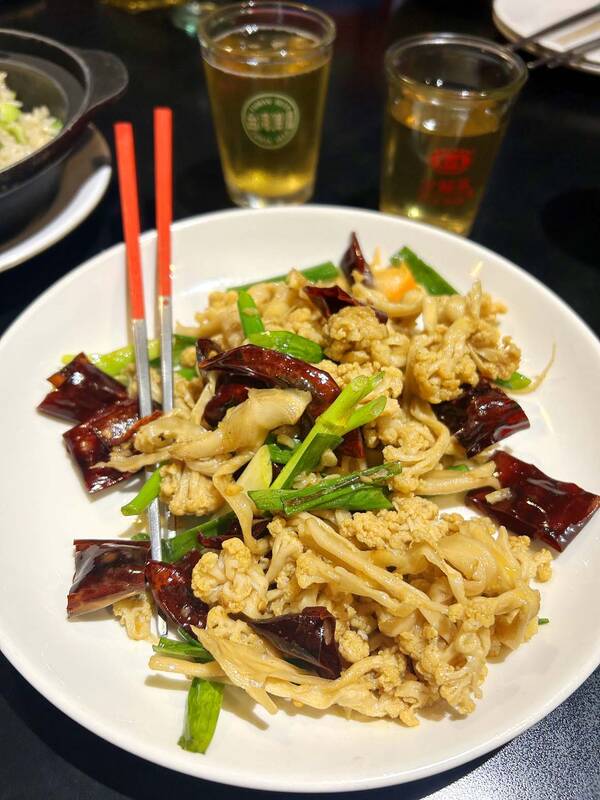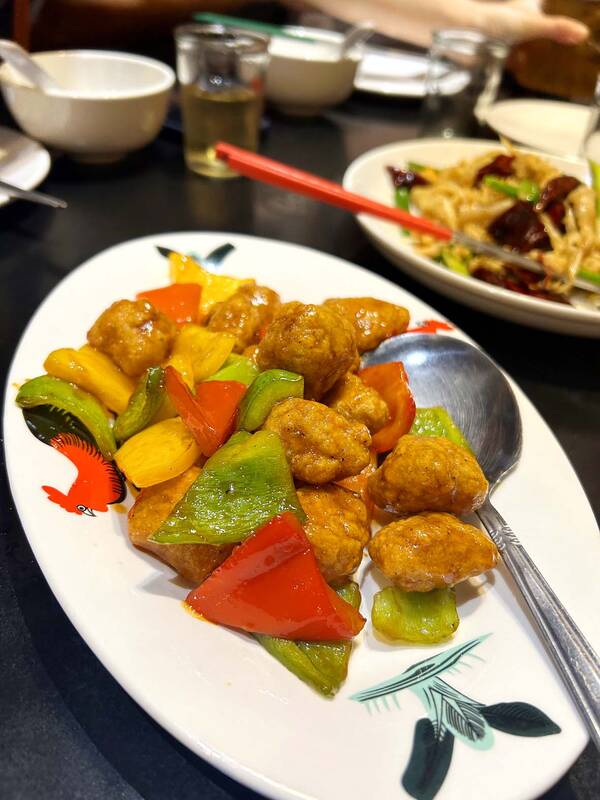If anyone has said being vegan in Taipei is easy, they’re either lying or loaded. Night markets can become a sad affair of grilled mushrooms and sweet potato balls. Yes, Taiwanese eateries will offer vegetable side dishes, but be sure to hold the pork, and at cafes, asking for oat milk is a roll of the dice.
Vegetarian-only eateries range from the basic Buddhist buffet to the expensive Western bistro, but rarely offer something in between. Enter Chao.
Everything about Chao (炒炒新亞洲蔬食) mirrors the conventional stir-fry experience, known locally as rechao (熱炒). Dim lights and rowdy crowds, the chinking of beer glasses and chopstick battles for the last shrimp ball. Diners dig into steamed chili cod, Taiwanese sausages and Teppanyaki beef platters. But here’s the catch: none of the food at Chao contains any animal products.

Photo: Hollie Younger
I’ll be the first to admit, Taiwan has reawakened my inner carnivore. But my circle of friends keeps me flexitarian-curious and I’ll forever be fascinated by vegan creations: how does modern alchemy recreate flaky fish from fungus?
Sometimes the innovative flair of a vegan restaurant can elevate the food to that next level, and Chao is the city’s best example of how vegan eateries can be exciting to everyone, while affordable, authentic and accessible to non-vegans.
I gather a six-strong crowd of locals and foreigners, meat-eaters and meat haters alike, for a Monday night feast. Reservations are required in advance, even on weeknights.

Photo: Hollie Younger
Tucked behind the busy streets of Zhongxiao East Road, red lights guide us down a quieter alleyway to an up-scale rechao spot with the iconic chao (炒) in neon lights.
We get started with a round of Taiwan Gold Medal beers and opt for the four person set menu with an extra order of rice. The menu may look intimidatingly broad but the top 10 dishes are advertised for easy ordering.
First up, the crispy fried “oysters” (NT$200) win the award for most realistic mock meat. Served classic Taiwanese style with a peppery seasoning and fried basil leaves, the interior, perhaps comparable to a chewy dough, almost had me fooled.

Photo: Hollie Younger
The pineapple shrimp balls (NT$350) are also almost unidentifiably vegan. A classic yet confusingly sweet stir-fry dish of crispy battered balls with condensed milk coating and, if lucky, a smattering of birthday cake sprinkles. Not only the texture but the shrimp flavor could fool even the best of us.
My personal favorite would be the Nyonya “fish” curry (NT$350). How they create such realistic hunks of glistening, flaky white fish is a mystery to me. Chao has their imitation seafood down pat. This Chinese-Malay fusion curry was creamy and cooling enough to balance our red-hot side dishes — the pickled Sichuan pepper and tofu (NT$200) has brought tears to our eyes.
But it’s the Teppanyaki sizzling beef (NT$280) that finishes the night with a touch of drama; a roaring hot plate of steaming “beef” medallions and caramelized onions with a strong hit of black pepper. The beef texture had chewy and tender layers just like the real deal, with the punchy sauce just masking the inevitable mushroom flavor of most mock meats.

Photo: Hollie Younger
Overall, nothing in my carnivorous soul craved the original. We shared dishes family-style, enjoying local flavors and laughter until 11pm when the last beer was empty. My vegan and vegetarian friends were truly grateful for an experience that felt authentic and inclusive.
In a city where meat is king, Chao proves that even the most dedicated carnivores can find joy in plant-based dining, a health and environmentally conscious choice for us all.
Now watch this space for my next review, featuring Taiwan’s award-winning beef noodle soup.

The Democratic Progressive Party (DPP), Chinese Nationalist Party (KMT), and the country’s other political groups dare not offend religious groups, says Chen Lih-ming (陳立民), founder of the Taiwan Anti-Religion Alliance (台灣反宗教者聯盟). “It’s the same in other democracies, of course, but because political struggles in Taiwan are extraordinarily fierce, you’ll see candidates visiting several temples each day ahead of elections. That adds impetus to religion here,” says the retired college lecturer. In Japan’s most recent election, the Liberal Democratic Party lost many votes because of its ties to the Unification Church (“the Moonies”). Chen contrasts the progress made by anti-religion movements in

Taiwan doesn’t have a lot of railways, but its network has plenty of history. The government-owned entity that last year became the Taiwan Railway Corp (TRC) has been operating trains since 1891. During the 1895-1945 period of Japanese rule, the colonial government made huge investments in rail infrastructure. The northern port city of Keelung was connected to Kaohsiung in the south. New lines appeared in Pingtung, Yilan and the Hualien-Taitung region. Railway enthusiasts exploring Taiwan will find plenty to amuse themselves. Taipei will soon gain its second rail-themed museum. Elsewhere there’s a number of endearing branch lines and rolling-stock collections, some

This was not supposed to be an election year. The local media is billing it as the “2025 great recall era” (2025大罷免時代) or the “2025 great recall wave” (2025大罷免潮), with many now just shortening it to “great recall.” As of this writing the number of campaigns that have submitted the requisite one percent of eligible voters signatures in legislative districts is 51 — 35 targeting Chinese Nationalist Party (KMT) caucus lawmakers and 16 targeting Democratic Progressive Party (DPP) lawmakers. The pan-green side has more as they started earlier. Many recall campaigns are billing themselves as “Winter Bluebirds” after the “Bluebird Action”

Last week the State Department made several small changes to its Web information on Taiwan. First, it removed a statement saying that the US “does not support Taiwan independence.” The current statement now reads: “We oppose any unilateral changes to the status quo from either side. We expect cross-strait differences to be resolved by peaceful means, free from coercion, in a manner acceptable to the people on both sides of the Strait.” In 2022 the administration of Joe Biden also removed that verbiage, but after a month of pressure from the People’s Republic of China (PRC), reinstated it. The American